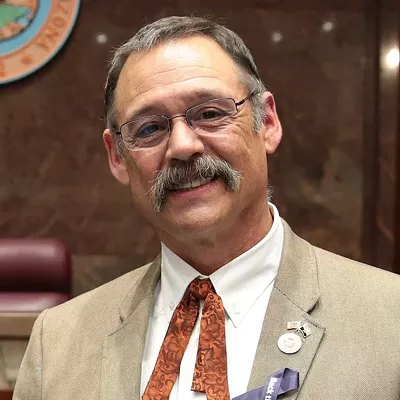Republican leaders have pushed one message about the state budget they passed last week: The numbers balance.
Senate President Russell Pearce boasted that the budget, which reduces state spending by about $1.1 billion, "used no gimmicks, no new rollovers and no borrowing."
"For years, the Legislature has played games with the Arizona budget," Pearce said in a statement. "Those games ended today, and our state has a brighter future because of the votes of our Republican caucus."
House Speaker Kirk Adams called the spending plan a "budget to be proud of."
"This budget honestly balances our checkbook for the first time in years," Adams said in a press release. "We're making deep and lasting cuts to government and instituting long-term spending reforms that will save taxpayers money and make government more responsible."
The $8.3 billion spending plan would indeed make an accountant happy. But to bring those numbers in line, lawmakers enacted deep cuts in state support for programs that aid the working poor, children, universities, state parks and a host of other programs.
Democrats, who unanimously opposed the budget, characterized the cuts as an attack on working Arizonans that will devastate the state's economic recovery and kill jobs.
"This budget is not in the best interests of Arizona," says Rep. Matt Heinz of Tucson. "We're bleeding our education system dry."
Arizona's public schools will get $183 million less in funding. Universities will see a cut of $198 million, and community colleges will lose $73 million from the state. The state's health-care program will be cut by a half-billion dollars, which could in turn lead to major reductions in federal matching funds.
Republicans also swept various funds that were earmarked for specific uses, including a grab of $1.5 million from State Lake Improvement Fund, and $2 million in gate fees from state parks. While those numbers are small in the context of the overall budget, the State Parks Board may be hard-pressed to keep parks open (and gate fees coming in) without those dollars. Parks staffers were working with Gov. Jan Brewer's administration to find other dollars they could use to maintain the system, while they continue to look for a long-term solution that puts the parks on stable financial footing.
"It doesn't look good," says Bill Meek, chairman of the Arizona State Parks Foundation. "Most of the parks do their best business in the spring, summer and fall, so they're very concerned about whether they have the ability to stay open between now and next October."
In many cases, the state cuts may also result in a loss of federal funding. Republicans eliminated roughly $30 million in support for child-care programs, which could cost the state $40 million in federal matching funds, says Bruce Liggett, executive director of the Arizona Child Care Association.
Liggett estimates that more than 13,300 kids will be dropped from a program that covers part of the cost of tuition at day-care centers, as of July 1.
"We know that will be a crisis for 7,200 parents of those children, who will be faced with leaving their kids in unsafe situations or quitting their jobs," Liggett says. "What it means in terms of the workforce: 1,600 teachers are going to lose their jobs."
Despite the deep cuts and the crowing about a straightforward budget, Republicans engaged in shell games by swiping dollars that had been bound for counties and local governments. And it remains to be seen how Gov. Jan Brewer will implement the half-billion dollars in health-care cuts.
Heinz, an emergency-room physician who represents Tucson's southside, says that Brewer administration officials have told him they are still developing a plan to implement the spending reductions. Rather than taking health insurance away from people who are now on AHCCCS, Brewer is exploring a plan to freeze enrollment and reduce the program's recipients through attrition, and to establish new co-pay requirements and other fees for certain high-risk patients, including smokers and overweight diabetics.
The enrollment freeze sets up a legal fight that could blow a hole in the budget. Attorney Tim Hogan, of the Arizona Center for Law in the Public Interest, said last week that he would sue the state, because the eligibility standards were put into place by voters and cannot be altered without voter approval.
"Those people are guaranteed coverage by Proposition 204," Hogan says, referring to the eligibility standards passed in 2000.
Heinz predicts the Arizona Supreme Court will block elements of Brewer's plan, and the federal government might block the plan for co-payments and other fees, which could force the Legislature to consider an alternative plan put forth by the Arizona Hospital and Healthcare Association.
"I don't think our budget work is done," Heinz says. "I believe we'll be back in six weeks to fix it."











